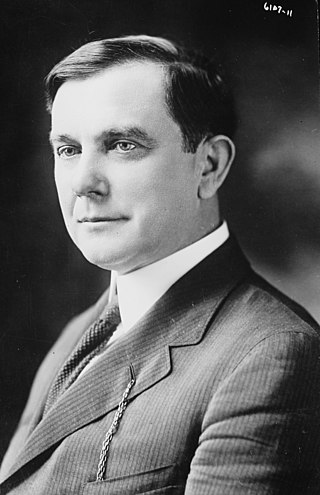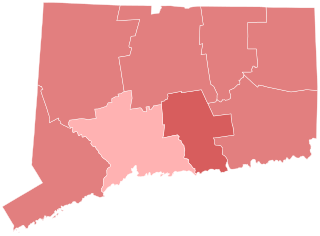
Malcolm Rice Patterson was an American politician and jurist. He served in the U.S. House of Representatives from 1901 to 1906, and as the 30th governor of Tennessee from 1907 to 1911. He later served as a circuit court judge in Memphis (1923–1934), and wrote a weekly column for the Memphis Commercial Appeal (1921–1933).

Ben Walter Hooper, was an American politician who served two terms as the 31st governor of Tennessee from 1911 to 1915. Elected as a Fusionist candidate, he was one of just three Republicans to hold the office from the end of Reconstruction to the last quarter of the 20th century. His success was due to divisions in the state Democratic Party over prohibition; he received support from some of the party. During his two terms, Hooper signed several prohibition laws, enacted a measure requiring mandatory school attendance, and signed a law requiring direct pay for women workers.

Kenneth Douglas McKellar was an American politician from Tennessee who served as a United States Representative from 1911 until 1917 and as a United States Senator from 1917 until 1953. A Democrat, he served longer in both houses of Congress than anyone else in Tennessee history.

The 1978 United States Senate elections were held on November 7, in the middle of Democratic President Jimmy Carter's term. The 33 seats of Class 2 were contested in regular elections. Special elections were also held to fill vacancies.

The 1972 United States Senate elections were held on November 7, with the 33 seats of Class 2 contested in regular elections. They coincided with the landslide re-election of Republican President Richard Nixon. Despite Nixon's landslide victory, Democrats increased their majority by two seats. The Democrats picked up open seats in Kentucky and South Dakota, and defeated four incumbent senators: Gordon Allott of Colorado, J. Caleb Boggs of Delaware, Jack Miller of Iowa, and Margaret Chase Smith of Maine. The Republicans picked up open seats in New Mexico, North Carolina, and Oklahoma, and defeated one incumbent, William B. Spong Jr. of Virginia.

The 1970 United States Senate elections was an election for the United States Senate. It took place on November 3, with the 33 seats of Class 1 contested in regular elections. Special elections were also held to fill vacancies. These races occurred in the middle of Richard Nixon's first term as president. The Democrats lost a net of three seats, while the Republicans and the Conservative Party of New York picked up one net seat each, and former Democrat Harry F. Byrd Jr. was re-elected as an independent.

Newell Sanders was a Chattanooga businessman who served for a relatively brief time as a United States Senator from Tennessee.

The 1934 United States Senate election in Tennessee was held on November 5, 1934. Incumbent Democratic Senator Kenneth D. McKellar was re-elected to a fourth term in office, defeating Republican former Governor Ben W. Hooper.

The 1932 United States Senate election in North Carolina was held on November 8, 1932. Interim Democratic Senator Cameron A. Morrison ran for election to a full term, but was defeated in the Democratic primary by Robert Rice Reynolds. Reynolds defeated Republican Jacob F. Newell in the general election.

The 1922 United States Senate special election in Pennsylvania was held on November 7, 1922. Incumbent Republican Senator George Pepper, who had been appointed to the seat by Governor William Sproul following the death of Boies Penrose, was elected to fill the remaining four years on the term to which Penrose had been elected in 1920. Pepper comfortably defeated five other candidates, including Democratic nominee Fred Kerr of Clearfield County.

The 1952 United States Senate election in Tennessee was held on November 4, 1952. Incumbent Democratic Senator and President pro tempore of the Senate Kenneth D. McKellar ran for re-election to a seventh term in office but was defeated in the Democratic primary by U.S. Representative Al Gore Sr. Gore easily won the general election against Republican Hobart Atkins.

The 1916 United States Senate election in Tennessee was held on November 7, 1916. Incumbent Democratic Senator Luke Lea ran for re-election to a second term, but was defeated for the Democratic nomination by U.S. Representative Kenneth McKellar. McKellar won the general election against Republican Governor of Tennessee Ben W. Hooper.

The 1922 United States Senate election in Connecticut was held on November 7, 1922. Incumbent Republican Senator George P. McLean was re-elected to a third term in office over Democratic attorney Thomas J. Spellacy.

The 2022 United States Senate election in Arkansas was held on November 8, 2022, to elect a member to the United States Senate to represent the state of Arkansas. Incumbent senator John Boozman was first elected in 2010, defeating Democratic incumbent Blanche Lincoln. Boozman was re-elected for a second term in the 2016 with 59.8% of the vote and ran in 2022 for a third term. Boozman won the May 24, 2022 Republican primary with 58.03% of the vote and subsequently defeated Democrat Natalie James in the general election by 34.64 percentage points. This was the best performance for a Republican senator in the state's history, and the third consecutive Republican win of this seat.

The 1922 United States Senate election in Indiana took place on November 7, 1922. Incumbent Republican U.S. Senator Harry Stewart New ran for re-election to a second term in office, but was defeated in the Republican primary by former Republican Senator Albert J. Beveridge. In the general election, Beveridge was defeated by Democratic former Governor of Indiana Samuel M. Ralston.

The 1928 United States Senate election in Tennessee was held on November 6, 1928. Incumbent Democratic Senator Kenneth McKellar was re-elected to a third term in office, defeating Republican Mayor of Knoxville James A. Fowler.

The 1940 United States Senate election in Tennessee was held on November 5, 1940. Incumbent Democratic Senator Kenneth D. McKellar was re-elected to a fifth term in office, defeating Republican Howard Baker.

The 1946 United States Senate election in Tennessee was held on November 5, 1946. Incumbent Democratic Senator Kenneth D. McKellar was re-elected to a sixth term in office. He defeated a primary challenge by Edward W. Carmack Jr. and easily won the general election against Republican William B. Ladd, and Independent candidate John Randolph Neal Jr.

The 1966 United States Senate election in Tennessee was held on November 8, 1966, concurrently with other elections to the United States Senate in other states as well as elections to the United States House of Representatives and various state and local elections. Republican nominee Howard Baker won the election, defeating Democratic nominee and Tennessee Governor Frank G. Clement with 55.7% of the vote.

The 2026 United States Senate elections are scheduled to be held on November 3, 2026, with 33 of the 100 seats in the Senate being contested in regular elections, the winners of which will serve six-year terms in the United States Congress from January 3, 2027, to January 3, 2033. Senators are divided into three groups, or classes, whose terms are staggered so that a different class is elected every two years. Class 2 senators were last elected in 2020, and will be up for election again in 2032.


















